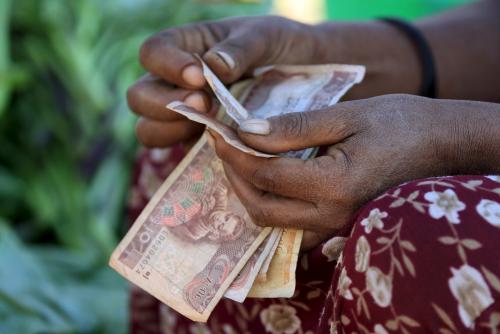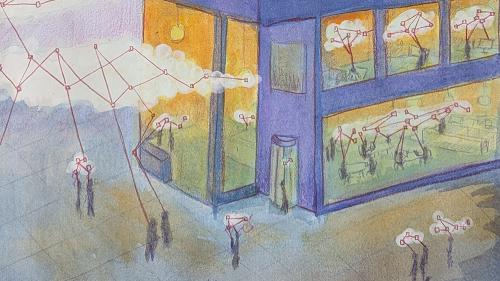Concerns that “free” money given by the state may discourage work among recipients are longstanding, intuitive, and in a way legitimate. Let’s unpack these points.
Fears about work disincentives of cash transfers date back not 25, not 250—but over 2,500 years. The Roman emperor Augustus was wary about doling out money to citizens because of purported adverse effects on farm labor. Religious leaders like Martin Luther were cautious about cash donations interfering with work incentives. Some of the founding fathers of economics, like Jeremy Bentham and Thomas Malthus, opposed transfer programs because they allegedly generated “dependency” among working-age populations.
These reservations also resonate with moral values. Espousing a work ethic based on effort and merit, fulfilling a responsibility and sense of duty toward communities, recognizing the pride, meaning, and dignity that come with a job—these are moral principles largely shared across cultures. Giving people cash directly as opposed to having them earn it on the labor market may constitute a direct threat to such values. It sounds like free riding. It amplifies a perceived societal divide between hard-working, tax-paying “givers” and demanding, entitled “takers.”
Moreover, labor markets are a key engine of upward mobility. The likelihood of exiting poverty goes hand in hand with employment. As such, transfers may “interfere” with labor supply decisions, as has been modeled extensively in economics, with some early experiments offering cautionary tales. In psychology, financial incentives are posited to thwart intrinsic motivation to work, as formalized in “motivation crowding” and “self-determination” theories.
While skepticism is understandable, it is also questionable. What if cash transfers are compatible with—and even strengthen—the jobs agenda? Such counterargument rests on five main facts.
First, people need cash from jobs… and cash for jobs. Getting and maintaining a job is expensive. Monetary expenses for accessing transportation, skills formation, credit, health, and child care, as well as the hidden costs of poverty-induced stress, can prevent efficient and sustained labor market engagements. Cash transfers can help reduce those barriers among beneficiaries by covering job search costs and improving mental health, thereby brightening employment prospects among those willing and able to work.
Second, today’s transfers are tomorrow’s earnings. Bottlenecks to jobs can emerge at early ages, making the transfers’ effects on curbing child mortality and stimulating cognitive development key preconditions for human capital formation and future economic contributions. In Mexico, adult women who received cash transfers as children had about a 40% higher probability of working than peers who did not get them. Similarly, in Brazil children benefiting from cash transfers earned more as adults (by an additional $250 per month).
Third, cash transfers preserve the workforce during economic transitions. Because unemployment insurance is limited in the context of high informality (as well as among those in gigs and precarious work), cash transfers can play such a role in times of economic adversity. They sustain the workforce and make it ready to bounce back when activities resume. Such a stabilization function occurred during the pandemic globally as well as during the industrial revolution in England.
Fourth, cash transfers help grow the economic pie. Money given to vulnerable people, because of their high propensity to consume, is largely money injected into markets. For every $1 provided as a cash transfer, an additional $1.30 on average is generated in the economy. In some cases, high cash multipliers triggered economic dynamism, with newly created demand engendering structural shifts in supply chains and creating new jobs. Overall, benefit-cost ratios for societies can be highly favorable in the long run.
Finally, poor people work hard, and they keep working while receiving cash assistance. Six comprehensive reviews on the impact of cash transfers on labor market outcomes consistently find that cash programs don’t reduce labor supply and time worked on average, and in many cases they enhance those labor market metrics (see the papers here, here, here, here, here and here). Just as recipients use money wisely, they use their time sensibly too. The dilemma is not whether cash creates disincentives—it is that people can be stuck in poverty despite being covered by social protection, having a job, and even working harder than the rich.
To summarize, two competing visions emerge. On one hand, there are deep-seated views against the provision of cash assistance in the context of jobs; on the other hand, there is a compelling case to be made for cash as support to work. History shows that the rhetoric of the former has been more influential and “stickier” than that of the latter.
To break from the past, a new narrative is needed. This means challenging the premises of current thinking. At the heart of the problem lies a fundamental question: Are people more motivated to work under the threat of scarcity, as often posited, or is a basic level of economic security a precondition for working and thriving? If we are to constructively reframe the relationship between cash transfers and jobs, we need to recognize that it’s part of a wider battle of ideas around human nature, power balances, and economic organization. And in the process, we may rediscover that philosophy and economics are joined at the hip.
The Brookings Institution is committed to quality, independence, and impact.
We are supported by a diverse array of funders. In line with our values and policies, each Brookings publication represents the sole views of its author(s).







Commentary
Are cash transfers good for jobs?
July 21, 2025